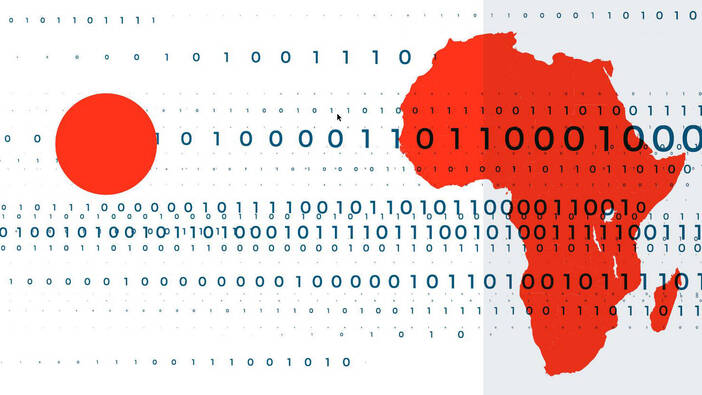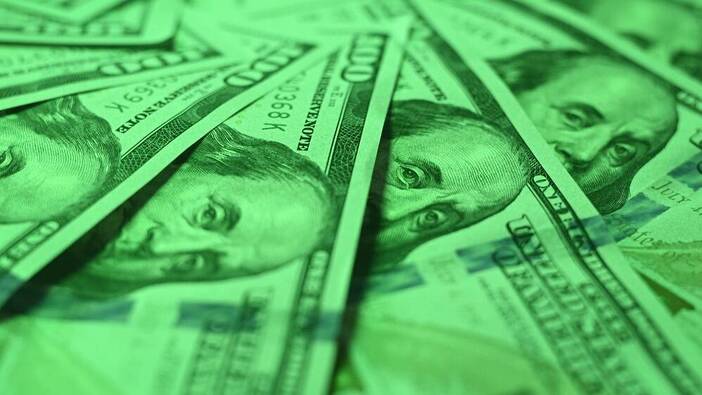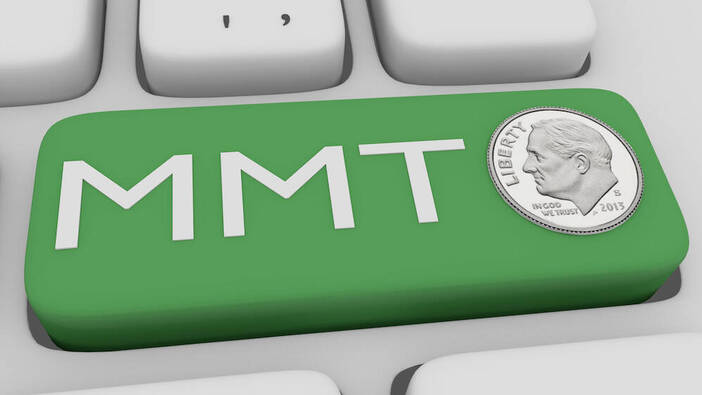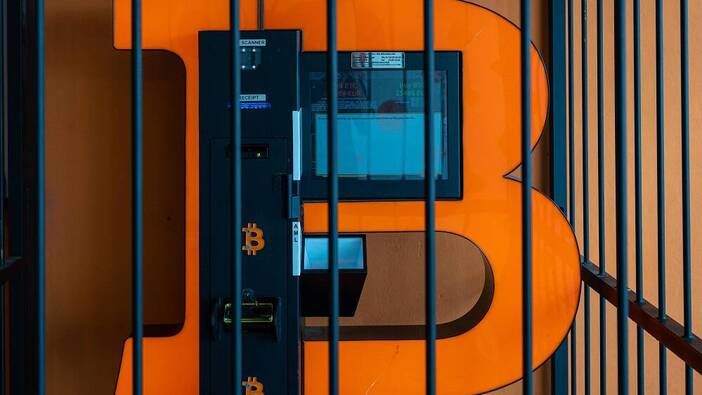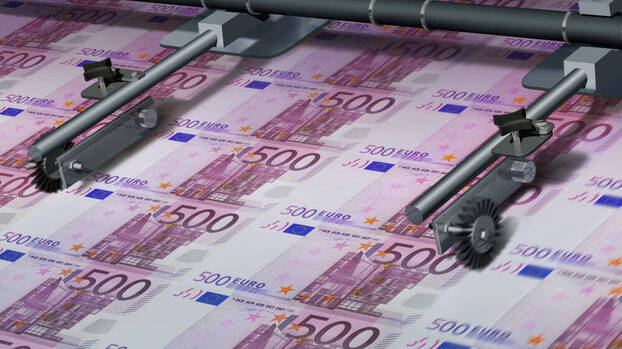
The last few years have witnessed a surge of public debate around Modern Monetary Theory (MMT), spurred by prominent heterodox economists such as Yanis Varoufakis but also a number of thinkers from the Global South, who see it as a tool for developing states to emancipate their economies from international financial institutions and pursue development on their own terms.
Dirk Ehnts teaches economics at Torrens University in Australia and is the author of several books on Modern Monetary Theory.
MMT is not without its opponents, however, with critics on both the Left and Right. Fabio De Masi, a former MP for Die Linke known for his investigation into the Wirecard scandal and the author of the recent Rosa Luxemburg Foundation study When Finance Meets Big Data, spoke with Dirk Ehnts, one of the most well-known academic proponents of MMT in the German-speaking world, about what MMT has to offer when it comes to guiding economic development, fighting inflation, and orienting the economy towards the public good.
Modern Monetary Theory (MMT) claims that sovereign states are different from private households and can never run out of their own currency. Could you explain this notion?
A household, a firm, and a local government all need to have money before they spend it. They are users of currency. Since they cannot create currency and run a money-printing machine in the basement, they need to “finance” their spending (i.e. via wages, profits, or credit). Income has to precede spending.
A federal government, however, is the issuer of currency. It creates new money when it spends. For example: when the federal government pays a construction firm to build a road, the account of treasury A at the central bank will be debited and the account of the bank of the construction company B credited. When bank B credits the account of the construction firm and workers receive the wages into their accounts, money has been injected into the economy by government spending.
What is money according to MMT? How does the state ensure that we all accept its money?
The state creates money to supply itself with resources. It is a modern version of natural taxes, when the state took, say, a tenth of everything produced. Creating money is the easy part, but in the beginning, citizens will not accept it. Why should they? It is just paper with numbers and symbols — nobody will be offering goods and services or work for money.
So, citizens are taxed, which creates a demand for money. If citizens are burdened by tax liabilities, this creates a demand for money as it forces citizens and firms to give up resources in return for money which they need for tax payments. If citizens don't pay taxes, they have to go to prison. Ultimately, the government uses coercion to get what it wants. This is most acceptable in democratic countries because we as the public decide via the political system who is taxed and how.
What does MMT mean by saying that taxes do not finance the state but rather the state needs to spend money first to tax?
We usually think that the state taxes us because it wants our money. However, the state is the monopoly supplier of currency. It could create all the money it wants — it does not need it from us.
Central banks are modern currency issuers and they can create money without limit and at basically zero cost. What the federal government wants from us, from households and firms, are the resources that it needs to further the public purpose. The government wants to hire workers, rent buildings, buy land, energy, goods and services, and so on. The actual tax consists of the resources we give to the government. We can’t use them anymore — this is ultimately a cost for us since we give up a part of our production and labour services.
On the other hand, we receive back public goods and services, whatever the government chooses to do with those resources. Since only the state can create money, it needs to spend before taxes are paid. Margaret Thatcher got it wrong when she famously said that “there is no such thing as public money, there is only taxpayer’s money”. The opposite is correct: there is only public money and all taxpayers use that money to pay their taxes. The root of tax “revenues” is the French word revenu, meaning “returned”: tax payments return the money to the state.
When money returns to the government via taxes, it stops being money. After all, modern money is an I.O.U. from the government, which promises to accept its own money for payments to the state. Since the government does not and cannot make payments to itself, money that is paid to a federal government ceases to be money. This is similar to handing a cinema ticket over to the man at the cinema. Issued by the cinema, the ticket has no function once it returns to the cinema. They will just throw it into the trash can.
Are taxes meaningless then? Could we just not all “print money” to solve all our problems or are their real constraints?
Quite the opposite! Without tax liabilities, a monetary system will have big problems of acceptance. When the French Revolution succeeded, all taxes were abolished. That meant that people had no reason to hold money. So, they all spent everything they had and hyperinflation resulted. Instead of democracy the French got a terror regime.
Creating more unemployment during an energy crisis seems like an odd policy choice. High inflation should be fought by increasing output, not by reducing it.
Tax liabilities are crucial and so are resource constraints. The federal government can use its money to buy all goods, services, and labour that the private sector offers — that is the limit. Some resources can be created by the government and this means that we can “print money” (create digital money) to solve those problems which we have the resources for. If we want to have more teachers, the government could increase the size of teacher training programmes at universities. Nature is the ultimate limit, however.
What are government bonds for? Do they finance the government?
No. The issuance of government bonds has served to steer interest rates in the economy. The government has no risk of default in its own currency. Hence, if the treasury offers four percent interest for its bonds, then there would not be any other financial asset which returns less. Why would investors accept more risk and less interest?
When a government sells a bond to a bank, bond revenues are the result. The treasury receives a central bank deposit into its account. So, when issuing bonds, the government swaps one public money for another — yellow dollars for green dollars, in Stephanie Kelton’s words. If the government bonds (yellow dollars) are financially attractive, banks will prefer them to reserves and cash (green dollars).
Since reserves today also pay interest (the deposit facility’s interest rate in the Eurozone is currently 0.75 percent), government bonds are not necessary anymore for central banks to control the interest rate. In the past, they were used to absorb the money that was created when the government spends, so that the interest rate would be stable at all times. Today, modern central banks set interest rates.
How could Greece then run into trouble during the euro crisis and why do we observe regular debt crises in developing countries?
The Greek government spends by asking its central bank to credit the accounts of the receiving banks, which then credit the accounts of firms and households that ultimately receive the money. The central bank debits the account of the Greek government, which usually goes negative. The laws of the eurozone force the Greek government to return its account to zero at the end of each day. Tax revenues are offsetting a part of the deficit, the remaining part is covered by bond revenues.
As long as the Greek government can sell bonds directly to a group of banks (there are no other buyers allowed), it can always return its central bank account to zero and hence ensure that the central bank executes its payments the next day. When investors start to doubt that there is demand for Greek bonds, this might mean that the Greek government can’t sell them anymore. Then its account stays negative and the central bank is not allowed to spend on its behalf. The obvious solution is to let the European Central Bank (ECB) buy up lots of government bonds so that investors are reassured that they can always sell them without a loss. The ECB acts now, but did not act then, which was a big mistake.
Developing countries undergo regular debt crises because many of them sell bonds in foreign currency to investors. Since they cannot create dollars or euros, these government bonds carry risk of default. Many developing countries have public debt in US dollars because they issued these bonds in the past and never had enough dollars to repay them, so they were forced to issue new bonds to repay the old bonds.
In good times, international investors buy these government bonds in foreign currency because they expect to be paid. When the world economy moves from boom to bust, the countries with the most debt in foreign currency are usually hit hardest.
Another cause of concern is a fixed exchange rate. When a country pegs its exchange rate to the US dollar, it promises to swap local currency for US dollars. Since only the Federal Reserve Bank can create US dollars, this is risky. When a country runs out of US dollars and sells its own currency against the US dollar on the foreign exchange markets, the exchange rates start to go down. If the effect is big enough, it can increase inflation because imports are now more expensive. It can also cause investment inside the country to collapse, because foreign financial assets are much more attractive.
How would MMT tackle inflation? Is it wise to raise interest rates as major central banks did in response to energy price hikes?
All inflations are different and there is no magic bullet. Inflation usually describes a situation in which prices and wages rise together. This time, however, it’s complicated. In the US, wages are indeed rising fast, but in Europe they are not. The same goes for many other countries. Higher energy prices translate into higher inflation, which is a symptom rather than a cause.
The most elegant policy solution would be to replace foreign energy imports with homemade renewable energy production. Then, the international prices of energy would not matter anymore because when calculating inflation, we only look at the prices that are paid by domestic consumers for goods and services they actually consume.
What would higher interest rates do to the economy? Central banks currently fight inflation by creating additional unemployment. They think that higher interest rates cause some investment projects to turn unprofitable. So, the rise in unemployment would lead to lower wage growth, and demand for goods and services would also go down directly, leading firms to increase prices more slowly.
Governments should take more responsibility when it comes to citizens’ rights. The right to work, the right to find a place to live with an adequate price, the right to education, the right to a pension in old age — the private sector should not profit from these basic necessities.
MMT says: wait a minute, not so fast. Firms usually react to higher costs by increasing their price. Why should this not work with higher interest rates? If firms would continue to invest but raise prices, then inflation would continue to go up. Another reason to expect prices to go up some more is that interest payments to public bondholders increase. The state spends more, bondholder income increases. If they spend a part of their income, demand for goods and services will go up.
So, it is probably a bad idea to increase interest rates now. Central banks seem to do it without coordination, so there is almost a race to increase rates. Probably they think that if they raise faster and more than the others, the exchange rate will go up and energy will be cheaper. This is like people in the audience at a cinema who get up because they can’t see well. In the end, everybody stands but nobody sees better than before.
It is doubtful that inflation will come down with higher interest rates. In the last decades, inflation only fell some three to five years after the first rate hikes. It is not said that the rate hikes did it — it might just as well be the case that higher inflation rates lead to higher tax payments, so that purchasing power of households and firms is reduced until the economy collapses.
Anyway, creating more unemployment during an energy crisis seems like an odd policy choice. High inflation should be fought by increasing output, not by reducing it. Otherwise, the unemployed will be our inflation fighters. That would be a very unfair outcome, given the spike in inequality during the pandemic.
What does MMT think about asset price inflation (such as real estate bubbles, share prices, commodity prices)?
MMT recognizes that whenever goods or services are “financialized”, are commodified and sold on markets instead of using other arrangements, there are big problems with value extraction. If companies use raw materials, they should be able to buy them. If investors buy raw materials only for speculative purposes, they create havoc on otherwise functioning markets.
Financial markets and banks should be heavily regulated in order to reduce the amount of speculation. There is no use for financial markets that offer new ways to bet on prices like interest and exchange rates or stock prices. They redistribute money in a zero-sum game. We should only allow financial markets to offer services that offer some value for us.
Public purpose matters here. It is a good thing that young families can borrow money and buy a house or a bigger flat when they have children. Otherwise, they would have to save until they can pay the price, but that will be too late. Also, banks should support businesses with loans. That leads to higher productivity, which can benefit us all. Banks and financial markets should not, however, accept financial assets as collateral. If anybody wants to buy something, let her or him sell financial assets first. Otherwise, an increase in leverage might result, pulling the economy down in the next crash, like in 2008–9 in the real estate markets of the US, Ireland, or Spain.
Governments should take more responsibility when it comes to citizens’ rights. The right to work, the right to find a place to live with an adequate price, the right to education, the right to a pension in old age — the private sector should not profit from these basic necessities.
The state can and often does provide schools and education for free. It can also provide places to live that are sustainable and reasonably priced. It can add a job guarantee to make sure that workers are not forced into jobs that are badly paid or, in David Graeber’s words, “bullshit jobs”. It can pay public pensions without problem. We need to find the right balance between responsibilities of the state and responsibilities of the private market.
